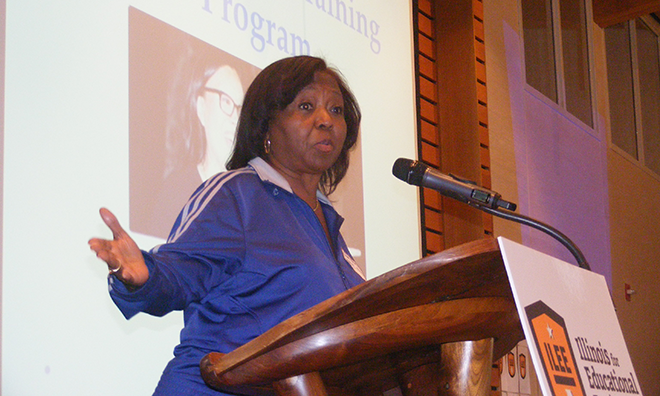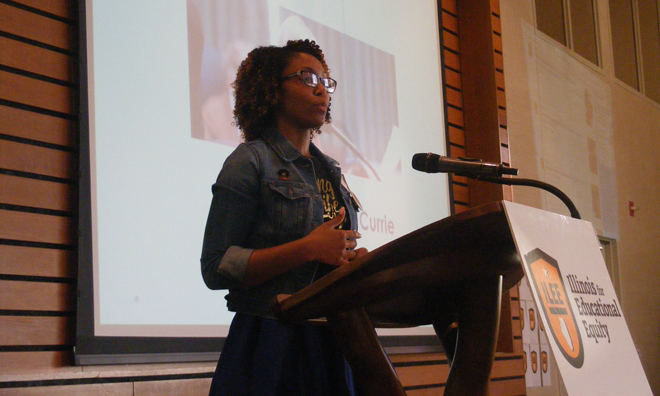
Fixing the formula for Illinois’ educational funding was on the mind of every educator, community stakeholder, elected official, student, and concerned citizen at the Illinois for Educational Equity (ILEE) Action For Educational Equality event held at the Chicago Theological Seminary, 1407 E. 60th St., on April 20.
ILEE is a community organization that seeks to promote policies that will create a more equitable education system for Illinois’ students. Through its advocacy, ILEE asserts it helped generate $300 million increase in state education funding for Chicago Public Schools (CPS), secured the first ever implicit bias training for 1,200 CPS school security officers, and preserved early childhood education training centers on Chicago’s South and West sides.
ILEE convened more than 200 persons fighting for equitable K-12 education funding. Illinois’ educational funding formula has drawn intense criticism from education advocates who deem its use of local property taxes as revenue for neighbor schools to be inadequate for low-income and rural communities. ILEE proposes a “fix” to the formula by replacing it with an evidence based model (EBM) which would establish a system where money would not be taken from any school district but rather create a cost of adequacy for school districts based on individual student needs that would distribute new state dollars to school districts. Through the EBM, education advocates contend efficiency, equity, transparency, and predictability would greatly increase. Ill. State Rep. William Davis (Dist.-30) sponsored House Bill 2808 (HB 2808) which would implement an EBM if passed.
Ill. State Rep. Babara Flynn Currie (Dist.- 25), one of the evening’s speakers, said she “admired the enthusiasm” of the advocates in the room and credited their voices for continuing to keep the fight for funding strong. She suggested EBM as a solution to the state’s educational funding disparity.

“Not only do we have to fix the formula, but we have to put enough money into the formula so the fix will take,” said Currie. “It’s easy to say fix it, but at the end of the day, if you’re just robbing Peter to pay Paul, you’re just transferring money from one little pot to another. And since nobody’s pot is big enough or full enough, then you really haven’t done the job.”
The Illinois House Majority Leader added that because the state is “not doing its share,” local property tax owners feel the burden.
Ill. State Rep. Mary Flowers (Dist.-31) said people can tell what kind of society they’re living in by how children and elderly are treated.
“There should be an outrage when you factor in how much we are spending on incarceration and recidivism and you know the lack of returns when it comes to that,” said Flowers.
Flowers contended that the issues facing Illinois’ educational system go beyond the funding formula.
“It’s not only the formula, it’s racism, it’s ignorance. You could fix the formula all you want, but if you still have two Illinoises or two Chicagos, one has the haves and the other the have nots, schools still won’t be fixed,” she said.
Taylor Beale, a 7th grade middle school teacher at KIPP Create College Prep, spoke to the audience about how cuts to the staff directly impact her ability to instruct her classroom. She said she’s a product of CPS and grew up near her school, which makes the challenges it faces all the more personal. She has been a teacher at KIPP for a year but has been a teacher for a total of five years, with jobs in Oklahoma and Wisconsin.
“One of our professionals who helped us specifically with behavioral [challenges] and my diverse learner teacher were let go,” said Beale. “How am I supposed to tell my students they are going to get a proper education when I can’t make that promise because the resources aren’t there?”
Beale said community members should reach out to their elected officials through whatever means they prefer to ask what is being done to help school funding.
“I’m working maybe 14, maybe 20 hours in a day,” she said. “I’m going to have to pick up that slack, but I do it for my kids because if I don’t, who will?”
Joshua Scott, a junior at Wendell Phillips Academy High School (WPAHS), said when he came to WPAHS from a school on the North Side of Chicago, both teachers and students appeared less motivated at the South Side school.
“I can see that their needs were met much quicker on the North Side than for students on the South Side,” he said.
Scott said a lot of things are needed but stressed the need for “teachers who are willing to work with students” and more supplies so students don’t have to share all of their resources.


